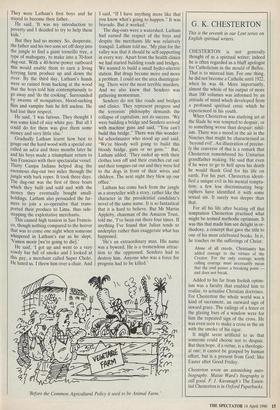G. K. CHESTERTON
This is the seventh in our Lent series on English spiritual writers.
CHESTERTON is not generally thought of as a spiritual writer; indeed he is often regarded as a bluff apologist for Catholicism in the mould of Belloc. That is to misread him. For one thing, he did not become a Catholic until 1922, when he was 48. More importantly, almost the whole of his output of more than 100 volumes was informed by an attitude of mind which developed from a profound spiritual crisis which he experienced in his youth.
When Chesterton was studying art at the Slade he was tempted to despair, or to something worse than despair: nihil- ism. There was a mood in the air in the Nineties that might be characterised as `beyond evil'. An illustration of precise- ly the converse of thsi is a remark that Chesterton remembered his Unitarian grandfather making. He said that even if he were to go to hell upon his death he would thank God for his life on earth. For his part, Chesterton identi- fied a unique evil in his mental tempta- tion; a few less discriminating biog- raphers have identified it with some sexual sin. It surely was deeper than that.
For all his life after beating off that temptation Chesterton practised what might be termed methodic optimism. It was this that made him see delight in or- thodoxy, a concept that gave the title to one of his most celebrated books. In it, he touches on the sufferings of Christ:
Alone of all creeds, Christianity has added courage to the virtues of the Creator. For the only courage worth calling courage must necessarily mean that the soul passes a breaking point and does not break.
Added to his far from foolish optim- ism was a faculty that enabled him to realise, to actualise Christian doctrines. For Chesterton the whole world was a kind of sacrament, an outward sign of inward grace. The railings of a fence or the glazing bars of a window were for him the repeated sign of the cross. He was even seen to make a cross in the air with the smoke of his cigar.
It might seem artificial to us that someone could choose not to despair. But then hope, if a virtue, is a theologic- al one; it cannot be grasped by human effort, but is a present from God: like Easter after Good Friday.
Chesterton wrote an astonishing auto- biography. Maisie Ward's biography is still good. P. J. Kavanagh's The Essen- tial Chesterton is in Oxford Paperbacks.


















































 Previous page
Previous page